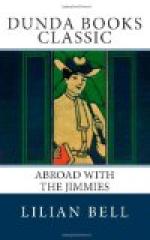However, the people could be influenced through their sympathies, and in the to-be-expected event of the death of England’s queen, or a calamity of national importance on our own shores, the sympathy which would be extended from each to each, through the medium of the press, would do more to educate the masses along lines of sympathy between the two great English-speaking nations than any amount of statecraft or diplomacy. The people must be taught by the way of the heart, and touched by their emotions. Their brains would follow.
As it is, the differences still exist. Take, for instance, their language, from which ours has so far departed and become so much more pure English, and has been enriched by so many clean-cut and descriptive adjectives that certain sentences in English and in American will be totally unintelligible to each other. On one occasion, going with a party of eight English people to the races, Bee looked out of the car window at the landscape, and said:
“How thoroughly finished England is. Here we are running through a hill country where they are so complete and so neat in their landscape that they even sod the cuts. It is like going through a terraced garden.”
It may be that the phrase she used was academic, but I am at least reasonable in thinking that the average American would know what she meant. Not one of those eight English people caught even the shadow of her meaning, and when she explained what she meant by “sod your cuts,” they said that she meant “turf your cuttings.” She replied that “cutting” with us was a greenhouse term and meant a part clipped from a plant or a tree. They said the word “cut” meant a cut of beef or mutton, to which she retorted that we might also use the term “cut” in a butcher shop, but when travelling in a hill country and looking out of the train window it meant the mountain cut. They said they never heard of the word sod, except used as a noun. She replied that she never heard the word “turf” used as a verb. We continued in an amiable wrangle which finally brought out the fact which even the most obstinate of them was obliged to admit, and that is that when traced to its proper root, the Americans speak purer English than the English.
House-boat hospitality we discovered to be conducted on a very irregular plan, for it appeared that the casual afternoon caller always meant tea and sometimes dinner. This is all very well if the people happen to be agreeable and the food holds out, but even I, the least conservative of the three women, am conservative about invitations to guests, nothing being more offensive to me than to be politely forced into a dinner invitation to people I don’t want. Another thing, it kept us constantly scurrying for more to eat, as house-boat provisions are all furnished by firms in town, and house-boat owners are expected to let the purveyors know beforehand how many guests to provide for at each meal.




